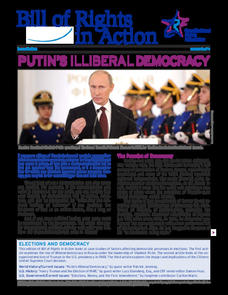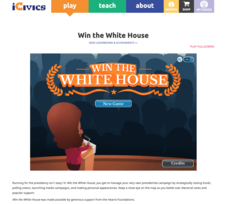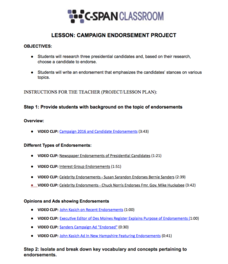Encyclopedia Britannica
Presidential Succession
"Who takes over if a president dies, resigns, is impeached, or is otherwise removed from office?" That is the question class members research. After listing the 18 successors in order, individuals respond in writing to a series of...
Encyclopedia Britannica
Candidate Position Research
As part of their study of the US Presidential election process, class members research a presidential candidate's position on a specific topic or topics. Formatting their research as a pro/con question ("Should the Death Penalty Be...
Encyclopedia Britannica
Candidate Flip-Flop or Evolution?
Beware political rhetoric! Connotation is everything! Groups select a presidential candidate and investigate how the candidate's position has changed on a specific issue. After analyzing the situation, the group determines whether they...
Encyclopedia Britannica
Candidate Book Report
After reading candidate biographies, class members select one candidate to research. They craft a report on the candidate's book, their position on issues, and the image the candidate wants to project.
Encyclopedia Britannica
Beyond a Two-Party System
Young political scientists go beyond the two-party system and research third-party candidates running in the 2020 US Presidential election. Groups present background information about the candidate, the party's platform points, and a...
Constitutional Rights Foundation
The Troubled Elections of 1796 and 1800
Congress does more than create new laws. Political scientists delve into the elections of 1796 and 1800 to understand how political parties, the Electoral College, and personal agendas affected the election process. The resource also...
Constitutional Rights Foundation
Putin's Illiberal Democracy
Is Russia really a democracy? High school scholars explore Russian democracy under the leadership of President Putin. The resource provides opportunity for group discussion, writing, and research to understand Russia's political history,...
Constitutional Rights Foundation
Elections, Money, and the First Amendment
Those who spend the most, win. Academics read informational text, participate in group discussion, and defend campaign reforms to understand the correlation between money, the First Amendment, and election results. The resource explains...
Constitutional Rights Foundation
Winner-Take-All: The Two-Party System
Two's company, three's a crowd. High school historians learn about the Electoral College, a two-party, winner-take-all voting system in the United States. The instructional activity explains the pros and cons of the two-party system,...
Constitutional Rights Foundation
Purged From the Voter Rolls: Husted v. A. Philip Randolph Institute
Once a registered voter isn't always a registered voter. Academics explore the topic of voter registration and hindrances to remaining registered. The resource focuses on data analysis, federal voter registration law, and Supreme Court...
Constitutional Rights Foundation
Slavery and the Electoral College
How did slavery mold the creation of the US Constitution? The final lesson in the series focuses on how slavery impacted the creation of the Electoral College. Academics learn how the Electoral College was created because Southern states...
Constitutional Rights Foundation
270 Votes to Win: The Electoral College in the United States
What exactly is the Electoral College and how does it work? The instructional activity is part of a larger series on government that explains what the Electoral College is and how it helps determine an election winner. Academics...
Curated OER
Election of 1864
An interesting lesson plan uses a hands-on-activity and group discussion to explore the 1864 presidential election and Lincoln's plans for ending the Civil War. Designed for high school, the resource also requires historians to...
American Battlefield Trust
Southern Secession and Abraham Lincoln’s Presidential Election
President Abraham Lincoln: a true humanitarian or a savvy politician? The lesson focuses on Abraham Lincoln's presidency and the secession of the southern states. Academics interpret how Lincoln's presidential platform promoting African...
American Battlefield Trust
1864-1865: Bringing the War to an End
The Civil War—in its breathtaking ferocity—came to a close in 1864. However, turmoil echoed throughout the country's politics, including the presidential context between Lincoln and McClellan. Performing chronology and primary source...
Smithsonian Institution
The American Presidency: Grades 4-6
An interesting unit explains the American presidency from the campaign trail all the way to the role of the president. Historians participate in discussions, create posters, conduct Internet research, and more to gain an understanding of...
iCivics
Win the White House
What does it take to win the White House? A video game allows young political operatives to try their hand at winning 1600 Pennsylvania Avenue by deciding on key issues, where and how to spend campaign dollars, and the role of polling...
West Virginia Department of Education
A State of Convenience: The Creation of West Virginia
Ever wondered why there is a West Virginia but not an East Virginia? The resource answers questions like this one and more as it takes an in-depth and detailed look at the history of West Virginia and how it became a state. Several...
C-SPAN
Campaign Endorsement Project
So many politicians, so many endorsements! Learn to differentiate between facts as well as the process of endorsements with an informative resource. Class members watch current endorsement videos, research candidates from three different...
Carolina K-12
Making First Vote Your Vote: Designing a Schoolwide Election
Encourage pupils to design an election plan for the entire school. They participate in a Board of Elections, create polling rules, discuss election controversies, write questions about the issues, run the election through an online...
C-SPAN
Student Symposium and Resulting Action
Your class may not be able to vote yet, but that doesn't mean they can't feel like they're part of the presidential election! The resource creates a symposium where pupils debate about a selected topic in current events during an...
University of Wisconsin
Analyzing Presidential Campaign Propaganda
Campaign propaganda has evolved from 1952 through the presidential election of 2008. A social studies activity prompts class members to analyze the devices used in ads and political cartoons, noting strategies they believe would work to...
John F. Kennedy Presidential Library & Museum
Red States/Blue States: Mapping the Presidential Election
Young historians investigate how voting patterns have changed by comparing the outcome of the 1960 election to the outcome of the recent election. A creative final assessment has participants making a news show wherein they provide...
Carolina K-12
How Do I Pre-Register and Vote in North Carolina?
This practical activity helps young citizens learn about pre-registration to vote in elections, discuss the merits and flaws of the pre-registration process, and register themselves. The concluding activity has young voters creating an...

























